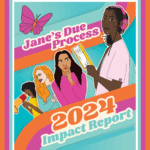Realizing you’re pregnant when you don’t want to be can be an overwhelming experience—especially if you’re a teenager. Alongside the questions, decisions, and emotions you’re confronting, teens also have to consider who can—or should—be entrusted with helping to navigate this process. In an ideal universe, all teens would be able to rely on parents or caregivers—to respect their decisions, to ensure that they receive the care they need, and to offer support through what can sometimes (though not always) be an emotionally complex process. In the real world, of course, nothing is that simple. So, how do you decide who to talk to about an unwanted pregnancy? And once you’ve decided, where do you start?
Talking to Your Parent(s) About Pregnancy and Abortion
Even in the best-case scenario, this is likely to be a stressful conversation. You’ve got your own feelings, questions, and concerns—introducing your parents’ feelings, questions, and concerns into the equation may seem overwhelming. You might be worried about how they will react, whether they’ll support your decisions, and how telling them could affect your relationship. But just because talking to your parents is difficult doesn’t necessarily mean you shouldn’t do it. Here are a few tips to help you think through your decision and strategies for helping the conversation go smoothly.
Keep in mind:
- Most parents want the best for their children. Every situation is different, of course, and some parents are abusive (if yours are, skip ahead to Safety First). But chances are good that your parents care about you and want the very best for you (even if your ideas about what that is aren’t the same). No matter how your parents feel about pre-marital sex or abortion, their top concern is probably you and your well-being.
- This is what Natalie Koss Vallejo discovered when she interviewed her parents—eight years after she had an abortion, and seven years after they leaned about it by reading her diary. Although Vallejo’s mother had some complicated feelings about the abortion at the time, what truly saddened her was the knowledge that Vallejo had to go through it all on her own—this, not the abortion itself, is what still matters to her. For Vallejo’s father, Natalia’s decision not to tell them suggested she didn’t trust them—an idea he still finds painful. But for Natalia, the decision wasn’t based in a lack of trust in her parents, but a fear of disappointing them. In spite of the complicated feelings involved, what mattered most to Natalia and her parents turned out to be each other—and though all families are different, this is likely to be true in most of them.
- Your parents (just like you!) are human. For some teens, anxiety about discussing abortion comes from a sense of not having lived up to a parent’s ideals. Talking about abortion might feel inconsistent with a set of beliefs you grew up with—a religious opposition to pre-marital sex, for example—and, whether or not you share your parents’ values, challenging them can feel daunting. But whatever the circumstance, it’s important to remember that your parents know that life is complicated, and sometimes unpredictable. They’ve certainly made mistakes of their own. They probably understand that their ideals are, well, ideals–goals they hope to strive for, but may not always meet. Maybe you share these ideals and maybe you don’t—but the bottom line is that your parents aren’t perfect. They’re human. And—guess what!—they already know that you are, too.
- Your parents (unlike you) are adults. This doesn’t mean you’re not awesome and smart and 100% in charge of your own body and decisions—you are. But along with having different legal rights than you, your parents have more years of life experience than you do, and have dealt with other complicated and unexpected situations before. They’ve probably known teen mothers; they have certainly, statistically, known women who’ve had abortions. (One in three women will have an abortion by the time they are 45.) As Vallejo’s dad puts it, “All children need to know this: that their parents have known people that were teenage mothers…It doesn’t even have to be about pregnancy, but kids should know that in almost any situation, their parents or someone their parents knows has probably been in that kind of trouble, as well.” You might worry that talking about your pregnancy will shock your parents—especially if it’s not an issue that’s come up before. But whether or not you’ve ever talked about teen pregnancy, this is not the first time they’ve heard of it. Really. It’s not.
- Having a conversation about abortion may not be easy for your parents—but it is, in fact, their job. Here’s another gem from Mr. Vallejo: “Parents have to understand that communication in families is often hard but easier for adults, and because of that, parents bear more responsibility to keep the channels open.”
- Consider the timing. Consider what an ideal conversation with your parents might look like, and when it would be most useful. Some teens may want to think through their decision to have an abortion with their parents; others may want to make their own decision first; still others may not want to tell their parents about a pregnancy at all until they’ve terminated it. It may be worth thinking about what you’re hoping to gain from a conversation with your parents. Have you made your own decision about your pregnancy? If you haven’t, do you think that talking with your parents would help clarify your decision, or make it harder? Are you looking for your parents’ advice and perspective? Their practical and emotional support? Answering these questions may help you decide when a conversation with your parents would be most useful.
- Think about what you’ll say. The Abortion Care Network has some great tips on navigating the conversation itself. They suggest expressing some of your own fears and hopes about how the discussion will go—i.e., “I need to tell you something but I’m afraid you’ll be angry;” “I want to talk to you and I’m hoping you can listen”—before delivering the news. After you’ve told them, give them some time to process: they may be surprised or experiencing some intense emotions, and that’s OK. They might have questions for you, and this can be a good opportunity to ask them questions in return—about their experiences with sex, abortion, pregnancy, etc. (And give yourself a chance to breathe: the hardest part of the conversation is already over.)
- Safety first: It’s normal to be anxious, even a little scared, about talking to your parents about abortion. They may be disappointed, or angry. In some families, conflict is not dangerous – parents can deal with their disappointment or anger in mature and safe ways. But in other families, conflict can result in situations that threaten your wellbeing. If your fear extends to your physical safety, you may want to be extra cautious about telling them—and extra careful about how you do it. Even though your parents may not be happy about the situation, they do not have a right to hurt you and it is not your fault if they do. At the end of the day, trust your gut—you probably know your parents better than anyone, and if telling them seems like a very bad idea, then don’t.
- If you’re concerned your parent could react violently or unpredictably, it makes sense to do some extra planning. You might want to invite someone you trust to be present during the conversation (bringing a parent along to an appointment with your OBGYN or Nurse Practitioner is also an option). If you think there’s a chance you might get kicked out of your living situation, it will make sense to have a back-up plan for where you might stay (including information about shelters in your area, if staying with family or friends is not an option). If drug or alcohol abuse is an issue in your family, be sure to approach your parent when s/he is most sober.
- Know your rights and resources. Regardless of your parents’ reaction to your pregnancy—or whether you decide to tell them—you are entitled to certain rights and resources: it’s important to be informed about what these are. If you live in a state (like Texas) requiring parental consent for abortion, you can seek a judicial bypass to obtain an abortion without their consent (call our hotline: 866-999-5263). You can consent to all pregnancy care except abortion on your own at any clinic, so you can get your own pregnancy tests, counseling, and ultrasounds. If you want to get on birth control afterwards, Title X clinics provide confidential services—no parental consent needed. There may be shelters serving pregnant teens in your area, or non-profit organizations offering other sort of support. If your parents are willing to go to counseling with you, most counties in Texas offer free family therapy to help deal with conflict and tension. And if you can’t or don’t want to talk to your parents, there may be other adults in your life—neighbors, teachers, doctors, or parents’ friends—you might want to consider talking to instead.
Remember—and remind your parents if they forget—that you don’t need to resolve everything in a single conversation. You’ve begun a tough and honest dialogue with each other: that’s important and, for now, that’s enough.
Por Jennifer DuBois
Darte cuenta de que estás embarazada cuando no quieres estar así puede ser una experiencia agobiante, especialmente si eres adolescente. Junto con estas preguntas, decisiones y las emociones que enfrentas, las adolescentes también tienen que considerar en quien pueden o deben confiar para navegar este proceso. En un mundo ideal, todos los adolescentes podrían depender de sus padres o encargados para respetar sus decisiones, asegurar que reciban la atención médica que necesitan y ofrecer apoyo a través de lo que puede ser a veces (aunque no siempre), un proceso emocionalmente complicado. En el mundo real, por supuesto, nada es tan simple. Entonces, ¿cómo decidir con quien hablar sobre un embarazo no deseado? Y una vez que hayas decidido, ¿por dónde empezar?
Hablar con tu(s) padre(s) sobre el embarazo y a interrupción voluntaria
Incluso en los mejores casos es probable que sea estresante esta plática. Uno tiene sus propios sentimientos, preguntas y preocupaciones. Tomar en cuenta los sentimientos, preguntas y preocupaciones de tus padres puede parecer agobiante. Es posible que te preocupe la forma en que vayan a reaccionar y si apoyarán tus decisiones. También es posible que te preocupe que contarles puede cambiar la relación que ustedes tengan. Pero solamente porque es difícil hablar con tus padres no significa necesariamente que no lo debes hacer. Aquí hay algunos consejos para ayudarte a pensar en tu decisión y algunas estrategias para hacer más fácil la conversación.
Debes tener en mente que:
La mayoría de los padres quieren lo mejor para sus hijos. Cada situación es diferente por supuesto y algunos padres son abusivos. Si tus padres lo son, lee primero SAFETY FIRST (Primero la seguridad). Es muy probable que tus padres se preocupen por ti y que ellos quieran lo mejor para ti (incluso si no concuerdan con lo que eso significa). Sin importar que piensan tus padres de las relaciones antes del matrimonio o la interrupción voluntaria, probablemente su mayor preocupación seas tú y tu bienestar.
Esto fue lo que descubrió Natalie Koss Vallejo cuando ella entrevistó a sus padres ocho años después de tener una interrupción voluntaria y siete años después de que ellos se enterraran al leer su diario de vida. Aunque la madre de Vallejo tenía unos sentimientos complejos sobre la interrupción voluntaria en ese momento, lo que le entristeció más que nada fue el conocimiento que Vallejo tuvo que pasar por el proceso sola. Esto, no la interrupción voluntaria en sí, es lo que le importa todavía.
Para el padre de Vallejo, la decisión de Natalia de no contarles indicó que no confiaba en ellos, algo que todavía le duele. Pero para Natalia, la decisión no fue por falta de confianza en sus padres sino por miedo a desilusionarlos. A pesar de los sentimientos complejos, lo que les importó más a Natalia y a sus padres resultó ser ellos mismos. Aunque todas las familias son diferentes, es probable que esto sea cierto con la mayoría.
Tus padres son humanos igual que tú. Algunos adolescentes se ponen nerviosos para hablar sobre la interrupción voluntaria porque se sienten que no han alcanzado las expectativas de sus padres. Hablar sobre el tema puede parecer inconsistente con los valores con que creciste. Por ejemplo, una oposición religiosa a las relaciones antes del matrimonio. Sin importar si compartes los valores de tus padres, desafiarlos puede ser abrumador. Sin importar la situación, es importante que recuerdes que tus padres saben que la vida es complicada y a veces impredecible. Por supuesto que ellos también han cometido errores.
Es probable que ellos entiendan que sus ideales son simplemente pues ideales; metas que esperan lograr pero que tal vez no siempre se pueden lograr. Tal vez compartas estos ideales y tal vez no, pero lo más importante es que tus padres no son perfectos, son humanos. Y ellos ya saben que tú también lo eres.
Tus padres son adultos y tú no. Tú eres genial e inteligente. Tú estás completamente a cargo de tu propia salud y decisiones, de verdad. Pero junto con tener derechos legales distintos a los tuyos, tus padres tienen más años de experiencia que tú, han enfrentado otras situaciones complejas e inesperadas antes. Probablemente han conocido a madres adolescentes y es cierto que, según las estadísticas, han conocido a mujeres que han tenido interrupciones voluntarias. (Una de cada tres mujeres tendrá una interrupción voluntaria antes de los 45).
Como dice el papá de Vallejo, “Todos los jóvenes necesitan saber que sus padres han conocido a madres adolescentes… Ni siquiera tiene que ser una situación de embarazo, pero los jóvenes deben saber que en cualquier situación sus padres o probablemente alguien que sus padres conozcan ha tenido ese tipo de problemas también.” Tal vez te preocupe que hablar del embarazo escandalice a tus padres, especialmente si no es un asunto que haya surgido antes. Pero sin importar si han hablado alguna vez sobre el embarazo en la adolescencia, esta no es la primera vez que han oído hablar del tema. De verdad que no lo es.”
Tal vez no sea fácil para tus padres hablar sobre el aborto, pero de hecho es su trabajo. Aquí hay otro comentario muy útil del Sr. Vallejo: “Los padres tienen que entender que la comunicación en las familias muchas veces es difícil pero que es más fácil para los adultos. Debido a eso, los padres tienen la mayor responsabilidad para mantener abierta las líneas de comunicación.”
Elegir el momento. Imagínate como sería una conversación ideal con tus padres y cuando sería más útil. Algunas adolescentes tal vez quieran considerar su decisión de tener una interrupción voluntaria sin sus padres. Otros tal vez quieran hacer su decisión primero. Sin embargo otras tal vez no quieran contarles a sus padres de un embarazo hasta que lo hayan interrumpido. Tal vez valga la pena pensar en lo que esperas lograr hablando con tus padres. ¿Has hecho tu propia decisión sobre el embarazo? Si no, ¿no piensas que hablar con tus padres ayudaría a aclarar tu decisión? ¿Buscas los consejos y la perspectiva de tus padres o su apoyo práctico y emocional? Contestar estas preguntas tal vez te ayude a decidir cuándo sería más útil hablar con tus padres.
Piensa en lo que vas a decir. Para Abortar tienen algunos buenos consejos para navegar la conversación en sí. La Red de Atención del Aborto recomiendan que expreses algunos de tus propios miedos y esperanzas sobre la conversación. Por ejemplo, “Necesito contarle algo pero tengo miedo que se vaya a enojar,” “Quiero hablar con usted y espero que me pueda escuchar,” antes de darle las noticias. Después de que les hayas contado, dales tiempo para asimilar la noticia. Es posible que se sorprendan o que experimenten algunas emociones intensas. Está bien. Es posible que ellos tengan preguntas para ti y esto puede ser una buena oportunidad para hacerles preguntas a cambio sobre su experiencia con las relaciones sexuales, la interrupción voluntaria, el embarazo, etc. (También debes darte una oportunidad para respirar ya que habrás terminado con la parte más difícil de la conversación).
La seguridad es lo principal. Es normal sentirse un poco ansiosa, incluso con un poco de miedo, para habar con tus padres sobre la interrupción voluntaria. Es posible que se sientan decepcionados o enojados. En algunas familias, el conflicto no es peligroso. Los padres pueden manejar su decepción o enojo con madurez y seguridad. Pero en otras familias, el conflicto podría tener como resultado situaciones que amenacen tu bienestar. Si tu miedo incluye miedo por tu seguridad física, es posible que quieras tener mucha cautela para contarles y hacerlo muy cuidadosamente.
Aunque es posible que a tus padres no les guste la situación, no tienen el derecho de lastimarte y tú no tienes la culpa si lo hacen. A fin de cuentas, confía en tu intuición, probablemente tú los conoces a tus padres mejor que nadie. Si contarles parece muy mala idea, no lo hagas.
Si te preocupa que uno de tus padres reaccione con violencia o de una manera imprevista, tiene sentido hacer algunos planes adicionales. Tal vez quieras invitarle a alguien de confianza para estar presente durante la conversación. Una opción es llevar a tu madre o padre contigo a tu cita con un ginecólogo o enfermera especialista.
Si piensas que existe la posibilidad de que te echen del lugar donde vives, tiene sentido hacer un plan para donde podrías quedarte, incluso tener información sobre los refugios cercanos si no tienes la opción de quedarte en la casa de algún familiar o amigo. Si hay problemas de abuso del alcohol o drogas en tu familia, debes hablar con tu padre o madre en el momento en que él o ella esté más sobrio.
Conoce tus derechos y recursos. Sin importar la reacción de tus padres a tu embarazo, o si decides decirles, tienes ciertos derechos y recursos. Es importante mantenerte informada. Si vives en un estado (como Texas) que requiere el permiso de tus padres para la interrupción voluntaria, puedes intentar conseguir autorización judicial para conseguir la interrupción voluntaria sin su permiso. Llama a nuestra línea telefónica: 866-999-5263.
Puedes dar tu permiso por ti misma para recibir todo tipo de atención médica antes del embarazo en cualquier clínica, menos la interrupción voluntaria. Así que puedes conseguir tus propias pruebas de embarazo, asesoramiento y ultrasonidos. Si quieres usar anticonceptivos después del procedimiento, las clínicas del Título X proporcionan servicios confidenciales. No es necesaria la autorización de tus padres. Es posible que haya refugios cercanos para adolescentes embarazadas u organizaciones sin fines de lucro que ofrezcan otro tipo de ayuda.
Si tus padres están dispuestos a acompañarte a sesiones de asesoramiento, la mayoría de los condados en Texas ofrecen asesoramiento familiar gratis para ayudar con conflictos y tensión. Y si no puedes o no quieres hablar con tus padres, puede haber otros adultos en tu vida con quien tal vez puedas considerar hablar en vez de ellos que sean vecinos, maestros, doctores o amigos de tus padres.
Recuerda y recuérdales a tus padres si se les olvide, que no necesitas resolver todo en una sola conversación. Han empezado a hablar honestamente sobre algo difícil, eso es importante y por ahora basta.




